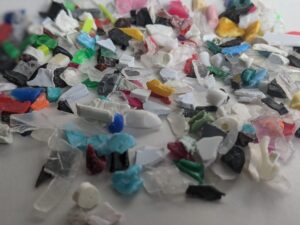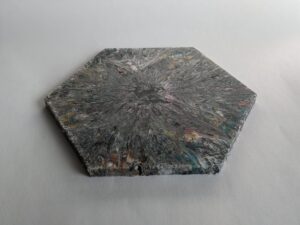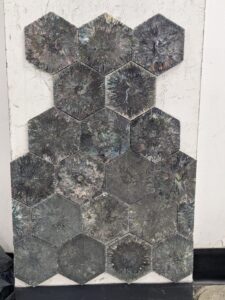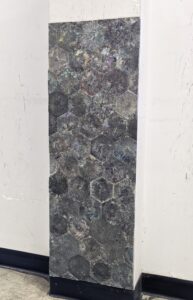Project Overview
Goodwill Industries of Alberta was the first organization to believe in the vision behind [Re] Waste, back when founder Corey Saban was still testing the concept out of his garage. At Goodwill’s Edmonton Impact Centre, unsold plastic items were shredded into flake through their internal recycling programs—but finding a viable end market for mixed plastics remained a major challenge.
At the time, [Re] Waste had been experimenting with turning mixed plastics into coasters, and when a sample of Goodwill’s plastic was sent over, a test run proved successful. This collaboration sparked a pilot project to repurpose plastic flake into recycled wall protection—a solution that would launch the [Re] Waste journey.
The Challenge
Goodwill was purchasing Fibre Reinforced Panels (FRP) for wall protection across its facilities. These panels were expensive, and at the same time, Goodwill had no consistent market for its shredded plastic flake, particularly when it came to mixed or contaminated plastics.
Key challenges included:
- Lack of end-market for mixed post-consumer plastics
- Need for an affordable, functional alternative to FRP panels
- [Re] Waste was operating at garage-scale capacity, producing about 7 coasters per hour, with frequent mold failures
- Labour-intensive installation—installing 65 hexagon tiles for just 5 square feet took over 10 hours
Our Solution
The first version of the solution was small but significant.
✔ Material Test: Goodwill sent [Re] Waste a sample of plastic flake for testing. A prototype coaster was successfully manufactured.
✔ Hexagon Tile Wall Pilot: Over 65 recycled coasters were arranged into a 5-square-foot wall installation at a Goodwill facility.
✔ Proof of Concept: The wall served as a functional alternative to FRP, and more importantly, proved that mixed plastics could be repurposed into a valuable, durable product.
✔ Early Learnings: The pilot highlighted both the potential and the scalability challenges—manual production, slow throughput, and time-intensive installation meant that larger-scale solutions would require investment and innovation.




The Results & Environmental Impact
✔ Diverted mixed plastic flake from landfill and gave it a meaningful second life
✔ Laid the groundwork for what would become [Re] Waste’s recycled sheet production
✔ Validated the concept that low-value, hard-to-recycle plastics could be transformed into functional, industrial products
✔ Built the foundation for future partnerships, product evolution, and scale
Looking Ahead
From this humble garage pilot, [Re] Waste has grown to become a national leader in circular economy solutions. Today, the team manufactures full-sized recycled plastic sheets used across Alberta in commercial buildings, and sustainable design projects.
And it all began with a 5-square-foot wall made from 65 coasters.
Partner Testimonial
"This pilot was the beginning of something amazing. It showed that the plastic we were shredding could be used for more than just landfill diversion, it could be part of Alberta's Circular Economy model, a real solution. We’re proud to have been there at the start of [Re] Waste’s journey."
- Mortimer Capriles, Director, Sustainability and Innovation
Want to turn hard-to-recycle plastics into functional products?
Contact [Re] Waste to explore circular economy solutions for your organization.
